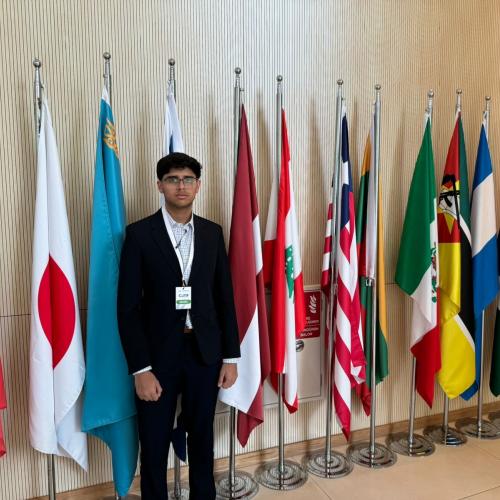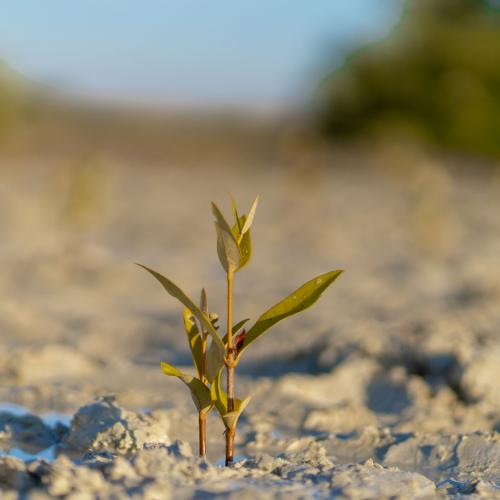The State of our Climate Today
With COP28 quickly approaching, this science-based refresher highlights the hard realities of climate change and how the global climate change conference can serve as a turning point for our collective future.
By Nadia Rouchdy, Head of Climate, Emirates Nature-WWF
The climate crisis has reached a moment of incalculable urgency in 2023. Climate scientists have raised numerous red flags over the years as global surface temperatures have skyrocketed and efforts to curb this rise have proved significantly insufficient.
Temperatures have risen considerably over the past decades, and contributing to extreme weather events worse and more frequent. The years from 2015 to 2022 were the warmest on record. The Earth is now 1.1°C warmer than pre-industrial times, and here in the UAE we are already facing an increase of 1.8°C. Just this past month, the first week of July saw the hottest week on record for the planet, as stated by the World Metrological Organization. Furthermore, an analysis published by Berkley Earth in July found there to be a more than 80 per cent chance of 2023 being the hottest year on record.
A short window in which to act
According to the latest AR6 report from the world’s leading body on climate change – the Intergovernmental Panel on Climate Change (IPCC), we have a window of just seven years in which we must halve global emissions if we are to limit global warming to 1.5°C, the threshold beyond which temperature rise will become irreversible. We must also achieve net zero carbon dioxide emissions globally in the early 2050s for global temperatures to have a chance to stabilize.
But we are not on track for 1.5°C.
Of the 40 indicators assessed by the Climate Action Tracker in its latest annual report, none are on track to achieve 2030 targets, and five indicators are ‘headed in the wrong direction entirely.’ With the current policies in place, there is a 66% likelihood that that global temperatures will breach 1.5°C temporarily between now and 2027 according to the World Meteorological Organization.
Every fraction of a degree matters
Climate change has already had negative impacts on all regions on Earth, and these will worsen with every increment of additional warming. Impacts beyond 1.5°C would result in 2.6x more heat stress, 2-3x more species loss, 29% more loss of coral reefs, and climate events becoming even more intense and more frequent. This in turn will have negative knock-on effects on resources, ecosystems, biodiversity, food production, food and water security and human health.

WWF’s “Feeling the Heat” report looks at the fate of nature beyond 1.5°C of global warming
Expected climate impacts in the UAE
The UAE is expected to get even warmer as a result of further climate change. UAE The State of Climate Report published by MOCCAE projects average temperatures to reach between 2.21°C to 2.38°C across different parts of the country by 2050.
A risk assessment by MOCCAE indicates that the impacts of climate change will be felt in the form of warmer summers and increased humidity over the Arabian Gulf. Rising sea levels will lead to an increase in mean high tides in coastal areas as well loss of inland habitats and resources due to higher salinity. The country is also likely to face more rainfall, with the possibility of more frequent, severe and high-impact weather events across the region.
These weather patterns pose high risks to the health of corals and wetlands as well as the ecosystems and biodiversity that rely on them – demonstrating the need to ramp up climate adaptation measures alongside the race to mitigate climate change. The UAE is not alone, every country is expected to face increased climate impacts and hazards with the most vulnerable set to face disproportionate losses and damages from climate change.

COP28 as a turning point for global action
Bringing climate change and energy to the center of the multilateral system has never been more challenging and more urgent than in 2023.
The COP28 climate conference that will take place in Dubai from November 30 to December 12, 2023, builds on decades of global cooperation in addressing climate change. This COP is especially important because it will see the results of the first Global Stocktake which assess the world’s collective progress towards the landmark Paris Agreement – and while it is clear that we are not on the right track, the process will inform the outcomes on mitigation, adaptation, finance and more that will need to be delivered by all parties.
Adopted at COP21 in 2015, the Paris Agreement is significant because it is the first global agreement on climate change that requires ratcheting up commitments from both developed and developing countries to take action to limit global warming and reduce greenhouse gas emissions. Some of its key aspects include the call for countries to submit Nationally Determined Contributions (NDCs) – individual pledges to reduce greenhouse gas emissions and take other actions to address climate change – and to update these pledges every five years.
Results of the first Global Stocktake are expected to underline how far off course we are from achieving the Paris Agreement, presenting an opportunity to rally the political will necessary to raise ambitions and ratchet up climate action to set the world back on course to 1.5°C.
COP28 will also see the negotiation of a global goal on climate adaptation efforts, with the hopes that the role of nature in climate mitigation and adaptation will be recognized and built into formal outcomes in order to unlock multiple benefits for climate, biodiversity and people.
As the host of COP28, the UAE is in the driver’s seat to build the political momentum necessary to achieve the negotiated and non-negotiated outcomes, through the action agenda and other political signals, needed to deliver a 1.5°C world.
With the most recent strategy announcement, it is clear that COP28 is looking to deliver an ambitious pathway under its ‘Four Paradigm Shifts’ that would help us course correct and lead us towards 1.5°C. If delivered, it would certainly make this COP one of the most successful. Time will tell how these packages will be delivered, how parties will contribute to the mechanisms to support formal workstreams and how non-state actors will be the driving force behind these ambitious outcomes in order to truly deliver an outcome where people, nature and climate are prioritized.
For us in the UAE, the next four months will be critical to partner with organizations to scale up our collective impact, to be even more ambitious in our plans, increase our targets, bring forward decarbonization timelines, and invest in nature and Nature-based Solutions. To summarize, COP28 has the potential to be a once in a lifetime opportunity to co-create a lasting legacy that truly demonstrates what state and non-state actors in the UAE are capable of doing in the face of climate change to deliver a resilient, nature positive and zero carbon world.

In the coming weeks, we will continue our series of blog posts on climate change, with an overview of local climate mitigation and adaptation initiatives, and how businesses can ramp up their decarbonization efforts.
To understand how your business can get involved, contact our partnership team and consider joining the UAE Alliance for Climate Action (UACA).



